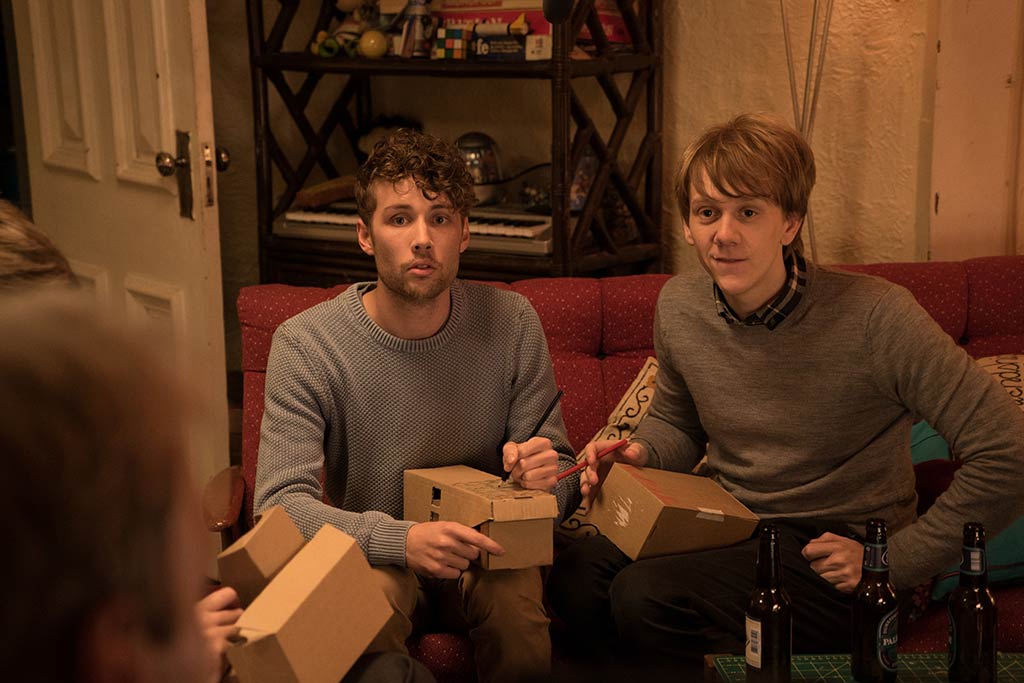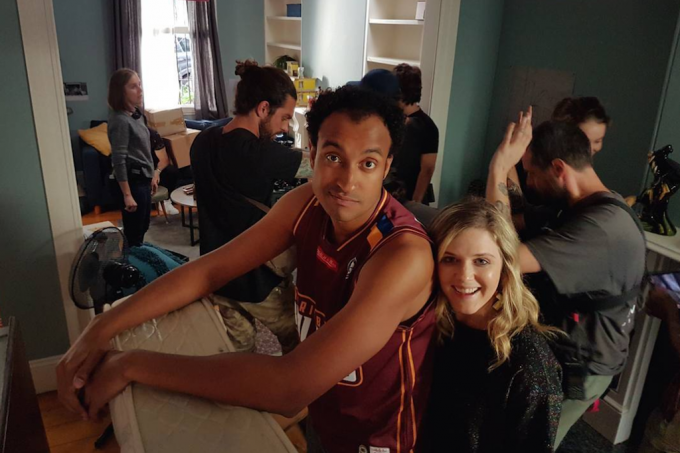Scruffy, Brash But Adorable: ‘The Other Guy’ Is Your New TV Show Crush
A new one to binge this weekend.
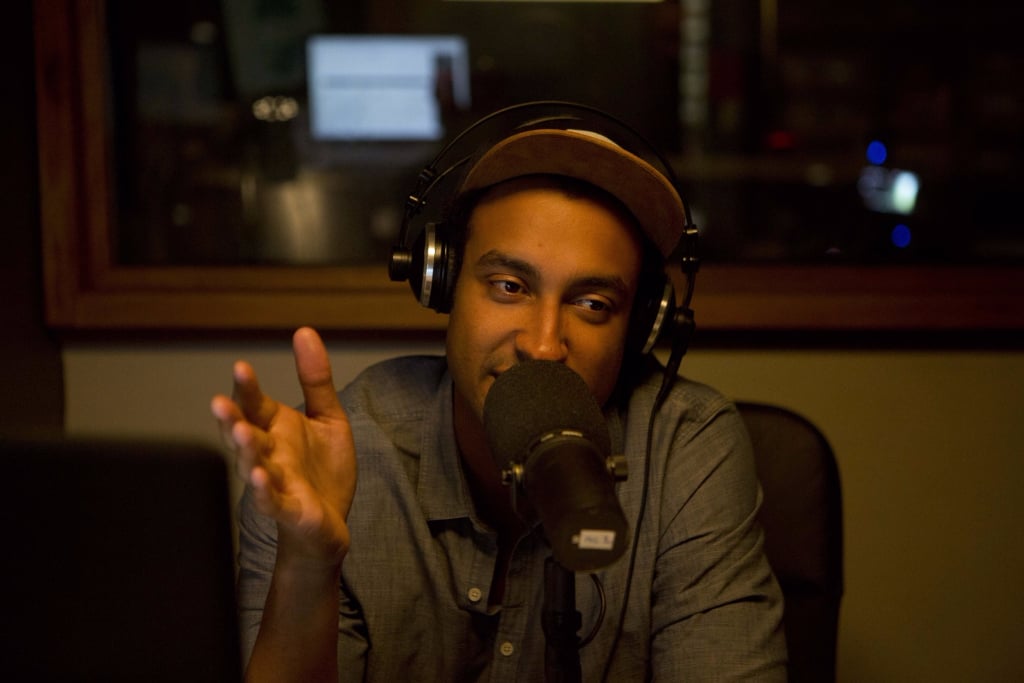
Is there a more pathetic image than the one presented near the end of The Other Guy’s premiere, of a hungover AJ (Matt Okine) sponging urine out of his ex-girlfriend’s mattress? Maybe not, but it’s effectively the defining image of Okine’s rumpled, self-centred, diverting new series, which dropped yesterday on Stan.
The series is Stan’s latest venture into local original programming, after dipping a toe in the pool with No Activity, Wolf Creek and Aussie stand-up comedy specials. Now Stan has collaborated with Okine and comedian Becky Lucas on The Other Guy, the semi-autobiographical story of a directionless breakfast radio host going through a rough break-up. Okine stars as AJ, aforementioned directionless radio host, Valene Kane (The Fall) plays his ex, Liv, and Harriet Dyer (Love Child, Ruben Guthrie) kills it as AJ’s crude best mate, Stevie.
Like AJ (and perhaps Okine, depending on the validity of the show’s autobiographical element), The Other Guy is a little brash and a lot scruffy. It’s hard to escape the feeling that the series is a bit unformed, or sometimes lazily rendered. But it’s also tender and adorable, as well as being the first authentic portrait of twentysomething life in metropolitan Australia since Josh Thomas’s exceptional Please Like Me.
I think I can confidently predict that you guys are going to absolutely love this one.
Millennial Drama On TV
I’ve got a pretty extreme love-hate relationship with the way millennials are portrayed on TV. They’re everywhere: from the absurd loft apartment of Jess, Schmidt and co. on New Girl, to the absurd walk-up apartment of Hannah, Elijah and co. on Girls, and the absurd suburban dream house of Josh, Tom and co. on Please Like Me. (Millennials on TV have ridiculous dwellings, is what I’m saying.)
The millennials on TV are generally one, or more likely all, of these things: slobbish, self-absorbed, silly, sex-obsessed, substance-obsessed and/or incognisant. Sometimes I feel super offended at/tired of this representation of me and my contemporaries. It reminds me of a quote about Gen-Xers in Frontline, said by a grumpy, dodgy Boomer employer being interviewed by the team: “Kids these days, they just don’t want to work!”
Then, other times, the portrayal of millennials as feckless, selfish and untethered hits just a little too close to home. Yes: sometimes my friends and I spend irresponsible nights out imbibing irresponsible amounts of alcohol and spending irresponsible amounts of money. Yes, sometimes we live a little… lackadaisically.
In the US in recent years, the millennial dramedy has gone through some rigorous evolutions. The somewhat one-dimensional portrayal of millennials as unknowably lazy has evolved to consider the context of millennial life. In US TV’s most recent Gen-Y dive, the thoughtful, absurdist Atlanta shrewdly contextualises Earn’s tendency toward fecklessness. Suddenly there is more heft to his relationship and child-rearing mishaps with Van, and afternoons spent working and toking with Paper Boi and Darius. They’re not simply lazy millennials; they’re wretched millennials fighting against the world that generations before have bequeathed them.
The Other Guy doesn’t have that same multifaceted richness, and perhaps it’s because our only real model for millennial angst comes from the especially brilliant Please Like Me. Rather, Okine’s series follows the Seinfeld model of television comedy: it’s mostly a show about nothing too important.
In the two episodes made available to critics, there’s honestly not a whole hell of a lot that happens, nor is there a great deal of meaning ascribed to what does. But what happens when nothing is happening makes the series undeniably appealing.
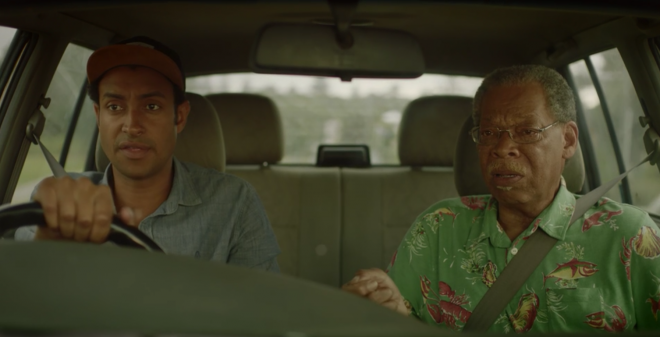
Matt Okine as AJ and Michael-Anthony Taylor as Daddy Mack.
Like a delicate, charming scene between AJ and his father (Michael-Anthony Taylor), which reminds you how infrequently you see more than one person of colour in conversation on Australian TV. Or the moment when AJ tells Stevie, “This has got to stop,” before grabbing the beer she’s offering him and taking a sip anyway. AJ lives in a shitty share house; he can’t afford a brand-new mattress to replace the one someone drunkenly pissed on. He has dates that are just as awkward and absurd as the ones I’ve had with the people I meet on Tinder and Bumble.
I did wish there was something lurking under The Other Guy‘s surface-level easiness. The series is not yet accomplished enough to balance the lightness and deep sincerity of Atlanta or Please Like Me. As I watched the opening episodes, I found myself wishing for a more perilous edge to the well-constructed “cool” of AJ and Stevie’s high-octane lives. I guess I hope that the show will take a stab at something deeper.
Still, in showcasing the specific fecklessness of life as an inner-city twentysomething — working (or not-working), drinking, fucking and fucking about — The Other Guy rings with an authenticity that makes the show’s messiness irresistible. If this truly is millennial life (and tbh it’s a fairly apt representation) well, I’m all for it. Okine and co. make it appear shabbily charming.
Diversifying The Aussie TV Experience
Because of the scale and scope of our local programming, there’s actually not a lot of new Aussie TV that makes it onto our screens every year. So, when something like The Other Guy comes along — a relatively new concept (a comedy about young lives, created by and starring an actor of colour) — we tend to approach it with unmanageable levels of hype.
The same thing happened with ABC’s Cleverman — a series that promised the world before it aired and, by the end of the first season, hadn’t quite delivered. (Ryan Griffen smartly readjusted audience expectations in season two, and those who kept watching were rewarded.)
If there is hype around The Other Guy, I kind of doubt the series will live up to it. While it’s diverting and enjoyable enough, it’s not the platinum standard of local streaming content that many of us hoped it would be. (I think that gong is currently reserved for Glitch, which was the ABC’s marvellous and sorely under-appreciated binge-fest, ripe to be digested over one feverish weekend.)
I want to root for The Other Guy, which is just fine at the moment, but has hints of being so much more.
Still, there’s plenty to like in The Other Guy, if you go in with your expectations well-managed. The comedic writing is very sharp, and slyly self-deprecating. My favourite jokes happened at Okine’s expense, like when he referred to hats as “bald man make up”. The show is pathologically obsessed with Okine’s AJ, who is sadly the least interesting and most hastily sketched character in the series, including the drug dealer (played by Bondi Hipsters‘ Christian Van Vuuren), who barely speaks three sentences in the pilot.
It’s funny that Okine is so tough to care about in The Other Guy, because in real life he’s made his name as a relatable, loveable “maaaaate“-type celebrity. Unfortunately, it just doesn’t translate on screen, mostly because Okine isn’t a strong enough actor to hit the emotional beats the show occasionally reaches for.
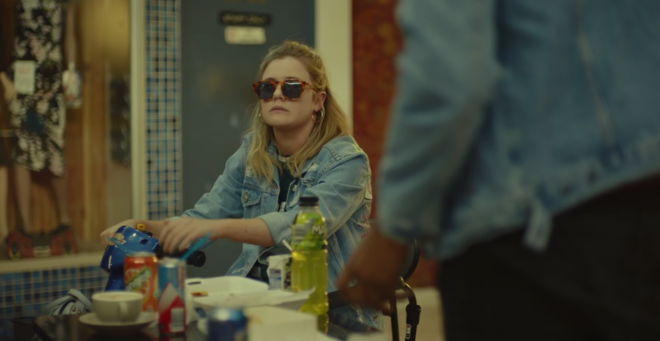
Harriet Dyer as Stevie.
But it’s a wonderful showcase for Harriet Dyer, who plays the hilariously off-kilter Stevie. With her brilliant comedic timing, her effortless deadpan delivery and her buoyancy, Dyer is a revelation, and brings some much-needed energy to the piece. She gets all the best lines, and the most appealingly absurd storylines — including a ripper in the second episode, where she has a potential flirtation with the pharmacist who dispenses her emergency contraceptive pill. I hope the show delves more into her background and motivations, because while she’s a brilliant absurdist foil for straight-man AJ, I want to see some heft behind her.
As AJ’s father Daddy Mack, Michael-Anthony Taylor is also a warm and funny presence. And I’ll stick around for Briggs’ — the man who’s making a super impressive mark all over Australian pop culture — appearance, even though he didn’t appear in the first two episodes.
I want to root for The Other Guy, which is just fine at the moment, but has hints of being so much more. There have been reports from the set that filming happened in just four weeks and that most scenes only had two takes apiece. That makes a lot of sense when you consider how scattered and unformed the show can feel. But I want it to succeed, to get a second season and to do better. Because it’s shows like this that diversify our Aussie TV experience.
It can’t all be zany workplace comedies, police procedurals and banal family hijinks. It can’t all be tiny, neurotic blonde women and leathery middle-aged white men. In order to get more of the really brilliant, transcendent TV that’s been trickling onto Aussie screens in the past decade, we have to allow some of these middling series a chance to learn and develop.
I remember Please Like Me, which The Other Guy will inevitably be compared to, took at least a season to reach the lofty heights that made it an international critical darling. I’m happy to give The Other Guy, which has a solid base and a great deal of untapped potential, that same chance to grow.
–
The Other Guy is streaming in full on Stan now.
–
Matilda Dixon-Smith is a Junkee Staff Writer. She tweets @mdixonsmith.
